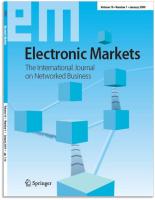The impact of early XBRL adoption on analysts' forecast accuracy - empirical evidence from China
(2013)DOI: 10.1007/s12525-013-0132-8
Abstract
Developing common standards, such as eXtensible Business Reporting Language (XBRL), to smoothen information sharing in the value chain is considered the leading issue for releasing the potential of e-business. Data standards such as XBRL play a critical role in an increasingly networked environment. Despite promises of XBRL to improve data accuracy, few empirical studies have tested the impact of early XBRL adoption on the quality of information. Theories explaining information technology (IT) productivity paradox indicate that value realization from IT innovations may experience time lag due to the need for technology refinement and diffusion. This study examines the impact of early adoption of XBRL on analysts' forecast accuracy with empirical data of Chinese firms. The uncertainty related to the unproven technology, such as information errors, has decreased analysts' forecast accuracy during the early adoption period among firms in an economy with little public information on listed firms. Our findings have practical implications that will facilitate the quality improvement of financial information in a networked business environment. Our findings highlight the importance of quality assurance and policy enforcement for value realization from XBRL adoption to regulators, filers, information consumers, the accounting profession and other stakeholders.
